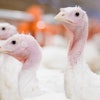An Auburn University veterinary professor in collaboration with researchers at Birmingham, Ala.-based Vaxin Inc. has developed the first “in ovo,” or egg-injected, vaccine to protect chickens against avian influenza.
The researcher, Haroldo Toro, says it provides 100 percent protection once an outbreak’s strain is determined.
“We have proven the principle, which is the major step in leading to commercially produced vaccine that could be vital to the poultry industry,” Toro said in a new release from Auburn University. “When an outbreak occurs, we would determine the strain and quickly create a vaccine within three months specifically for it.”
The researchers inserted a gene from a low pathogenic avian flu virus strain (H5N9) into a non-replicating human virus, a Vaxin proprietary technology, which was then injected into developing chicken embryos still in the egg. When protection induced by the vaccine was tested against two highly pathogenic avian flu viruses, a Vietnam H5N1 strain and a Mexican H5N2 strain, the results showed 68 percent and 100 percent protection, respectively.
“We can vaccinate lots of birds in a quick, cost- and labor-saving manner which otherwise would not be possible,” Toro also said. “Most poultry operations already have automated injection machines to vaccinate against Marek’s disease, injecting up to 40,000 eggs per minute. Our vaccine is produced through cell cultures, so we can easily make enough vaccine for thousands of birds.”
The next step is gaining federal approval to commercially produce the vaccine. Toro says he expects that to take two or three years.
Toro’s research is funded through a USDA program set up in 2004 for universities to study avian influenza and appears in the scientific journal, Vaccine.












